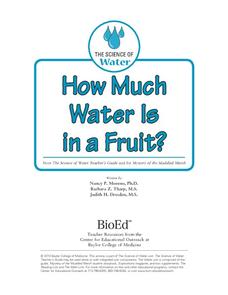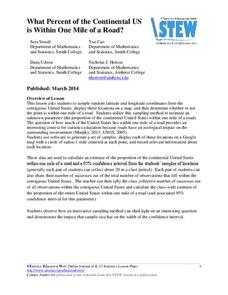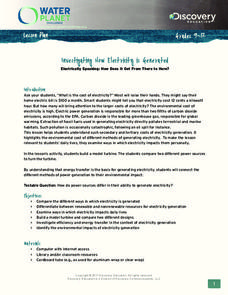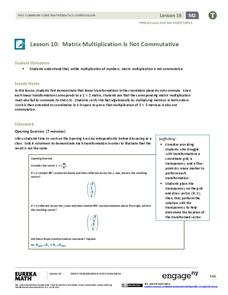Missouri Department of Elementary
What Color is Your Apple?
Build your classroom community with an activity that uses apples to examine oneself and their classmates. Participants draw four large apples on blank paper then exchange them within a small group. Group members write a character trait...
Missouri Department of Elementary
How We Are Alike And Different
Scholars develop social awareness by exploring the concept of similarities and differences. Learners examine two beverages and use a Venn diagram to identify similarities and differences. They tally each item to identify if they are more...
Baylor College
How Much Water Is in a Fruit?
Compare the volume of an orange to the volume of liquid that can be extracted out of it. Also compare the mass of an apple before and after it has been dried out. In both of these activities, children find that there is an appreciable...
Wind Wise Education
Where is it Windy?
How is the wind up there? The class builds a topography model using materials available in the classroom, then place wind flags in different locations on the landscape. Using a fan as a wind source, pupils collect data about how wind...
Statistics Education Web
What Percent of the Continental US is Within One Mile of a Road?
There are places in the US where a road cannot be found for miles! The lesson asks learners to use random longitude and latitude coordinates within the US to collect data. They then determine the sample proportion and confidence interval...
Curated OER
A Resource to Use with Call It Courage
Armstrong Sperry's Newbery Medal winning Call It Courage, the story of the journey of Mafatu, a young Pacific Islander, is the core text of a 26-page resource guide.
Curated OER
Using Figurative Language
Adding details and figurative language makes any story more fun to read! After reading two versions of the same story, one devoid of figurative language and one embellished, young writers are asked to add alliteration, hyperbole,...
Scholastic
Spring Is Sprung: Water Movement in Plants
Young scientists use food coloring and celery stalks to determine how water travels through plants.
EarthEcho International
Investigating How Electricity is Generated
What is the real cost of electricity? The real cost is not just the price you pay, but the environmental and economic costs as well. Scholars build, use, and judge the effectiveness of a turbine. They also investigate the...
Fluence Learning
Writing an Opinion: Is Pride Good or Bad?
Does pride really goeth before the fall, or can it be essential to one's development? Second graders read two of Aesop's fables that refer to pride in their morals, and write a short essay about whether pride is good or bad, based on...
Skyscraper Museum
What is a Skyscraper?
Skyscrapers are amazing feats of architectural design that create the iconic skylines of the world's biggest cities. Young architects explore the defining characteristics of these monstrous towers with the first instructional activity in...
Institute for the Professional Development of Adult Educators
Using Context Clues with Signal Words
When you come across an unfamiliar word in a text, do you skip it and move on? Practice using context clues to identify words you don't know with a thorough set of language arts lessons. The resource reinforces close reading and critical...
Scholastic
Defining Conflict Using "The Interlopers"
Feeling conflicted? Work out those issues with a language arts instructional activity on internal and external conflict. Using "The Interlopers" by Saki, class members identify the conflicts between the characters before writing...
EngageNY
Matrix Multiplication Is Not Commutative
Should matrices be allowed to commute when they are being multiplied? Learners analyze this question to determine if the commutative property applies to matrices. They connect their exploration to transformations, vectors, and complex...
Teach-nology
When to Use the Plural Form
Singular or plural? Primary graders are asked to circle the singular or plural form of the noun illustrated on a colorful worksheet.
PBS
Copyright and Fair Use
When is using someone else's copyrighted material appropriate? Learn about copyright and fair use with a activity from PBS.org. Scholars read through a reference sheet about authors' rights and users' rights, and then create posters...
WindWise Education
What is Wind Power's Risk to Birds?
How is risk determined? Through the use of a reading passage, individuals or groups learn about bird interactions with man made structures along with wind turbines. Pupils use information from the second reading passage to conduct an...
CK-12 Foundation
Greatest Common Factor Using Lists: Tiling the Kitchen Floor
Use a combination of tiling a rectangle to find area and find the greatest common factor of the lengths of two sides and the area they create. Pupils increase and decrease the sides of the rectangle before answer five questions...
Cold Spring Harbor Laboratory
DNA Is Only the Beginning for Understanding the Human Genome
Mario Capecchi requested funding for a new procedure targeting genes and was rejected. Four years later, after he proved it worked, the NIH apologized and funded his research. Use an online interactive to learn about his research and the...
Curated OER
There Is/There Are And School Life
In this school supplies and "there is/there are" online worksheet, students enter the names of six school supplies that are shown by clip art pictures, they unscramble the names of school subjects, and use drop-down menus to choose...
Teach-nology
Using the Thesaurus: Synonyms
Kids are asked to choose the one option that is not a synonym for the provided keyword on a synonym worksheet.
Texas State Energy Conservation Office
Are Your Computers Wasting Energy?
After reading about the amount of energy that is used to power a personal computer, learners take a look at their own computer use and therefore, their energy consumption. They do this through a series of questions and computations on...
National Wildlife Federation
Quantifying Land Changes Over Time Using Landsat
"Humans have become a geologic agent comparable to erosion and [volcanic] eruptions ..." Paul J. Crutzen, a Nobel Prize-winning atmospheric chemist. Using Landsat imagery, scholars create a grid showing land use type, such as urban,...
Curated OER
Using Google Docs
This is a fantastic resource for teachers to have in their tool belts upon entering into the world of using Google Docs in the classroom! It is a reference sheet with step-by-step instructions and graphics for everything from basic...























